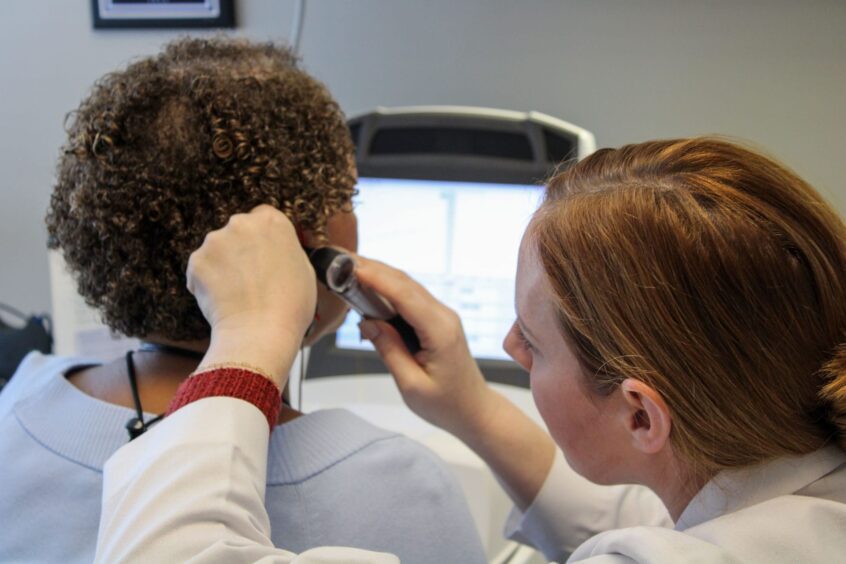If you’re a first-time hearing aid buyer, your journey will likely be confusing. Here are 3 marketing tactics you should be aware of if you’re shopping for prescription or over-the-counter hearing aids.
Searching for and buying prescription hearing aids can be a confusing journey, making it important for you to research hearing aids and audiologists before making a purchase. So, let’s start with the hearing health professionals who can guide you in your buying experience.
The two most common groups of professionals who sell prescription hearing aids are audiologists and hearing aid dispensers. Buying prescription hearing technology from another source doesn’t provide the quality care or support needed.
Audiologists diagnose and treat hearing loss, and should have doctoral-level credentials. Dispensers pass a state exam to earn their dispensing license. The scope of practice for an audiologist is much more extensive than for a hearing aid dispenser. Not only can an audiologist assist in choosing hearing aids that match your needs and budget, but they also can diagnose and manage other issues related to hearing, such as tinnitus, sound sensitivity, dizziness and balance disorders.
Assistance from an audiologist or hearing aid dispenser isn’t necessary in order to purchase over-the-counter hearing aids, but these professionals can be helpful in diagnosing a hearing loss and determining how severe it is. Over-the-counter devices are only suitable for self-perceived mild-to-moderate hearing losses.
Look Out!
When shopping for prescription hearing aids, also be alert to misleading marketing practices used in many advertisements, including:
- “Field Trials” – One popular tactic is to state in an ad that a practice is looking for X number of patients to take part in a field trial for new technology. The term “field trial” is misleading because it sounds like you’re getting in on the ground floor for technology that’s being tested, when in reality, these trials happen long before the technology is offered to the public. In fact, this process is tightly regulated by the Food and Drug Administration. An ad for a “field trial” is just a way to get you to call and schedule an appointment and it is considered an unscrupulous business practice by professional audiologists.
Practices that participate in legitimate research typically ask for or contact qualified individuals who meet strict study eligibility requirements rather than placing a general public advertisement. In addition, a practice or vendor study usually has clearly stated study objectives and guidelines.
- “Little to no cost” — It’s very rare that insurance covers the entire price of hearing aids. Generally, the “low-cost” hearing aids advertised are entry-level devices that may indeed be less expensive, but often don’t meet the individual and unique needs of users. When you schedule an appointment with someone who uses this tactic, don’t be surprised if they try to sell you more expensive technology.
Plus, be sure to ask if they accept your insurance up front and request a “good faith estimate.” This is now the law. If you do not have insurance, have insurance without coverage for items and services such as hearing aids, or if you wish to pay on your own without insurance, then you should be given a good faith estimate for the private pay costs of the services anticipated.
The estimate will include the total expected cost for all items or services that are reasonably expected to be provided for that appointment non-covered during that visit. The regulation requires that if you schedule an appointment at least 10 days in advance, the good faith estimate will be delivered within 3 days of scheduling. If you receive a bill that is at least $400 more than your estimate, you can dispute the bill by visiting www.cms.gov/nosurprises/consumers.
- “Free hearing tests” — This marketing strategy is just another way to “hook” you into scheduling an appointment. A screening is not a comprehensive diagnostic hearing evaluation. It typically is not a part of a medical record, doesn’t belong to the person being tested, and usually isn’t transferable. Full diagnostic hearing evaluations from qualified audiologists determine if you have a hearing loss and can be shared with your primary care provider. Audiologists then provide the necessary hearing aid technology recommendations specifically tailored to your hearing loss, budget and lifestyle.
To be certain you have the best possible experience with diagnosing and treating a hearing loss, schedule an appointment with a doctoral-level audiologist.



